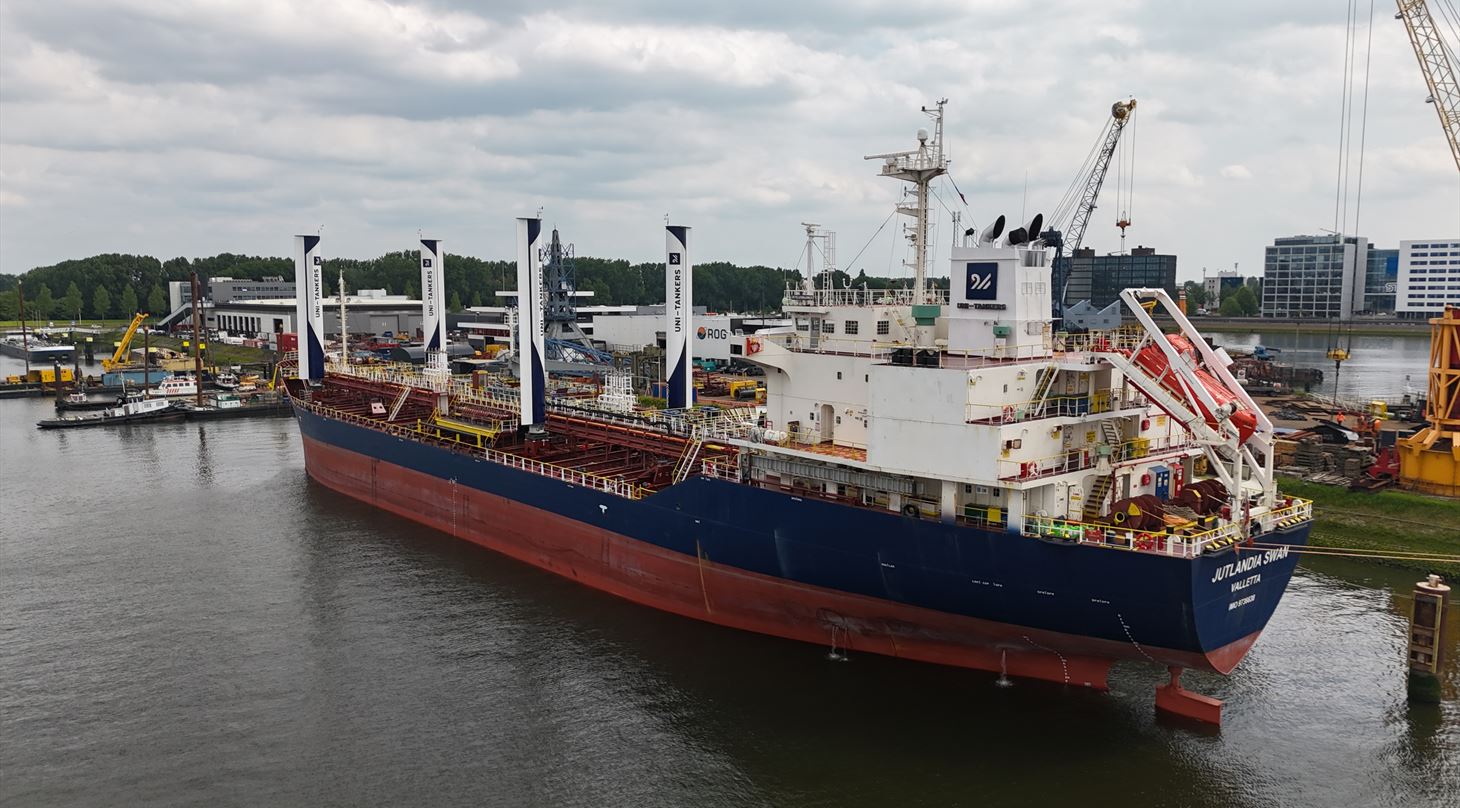
Danish Test Vessel to Help Chart the Course for Sail-Assisted Emission Reductions in Shipping
Jutlandia Swan with all four wind sails (VentoFoils) installed – ready for the next phase in the Cleanship project.
New real-life measurements will provide insights into the actual effect of wind-assisted sails on commercial vessels. Four modern sails have just been installed on Uni-Tankers’ M/T Jutlandia Swan, and the Cleanship project will soon collect new data for the entire maritime sector.
Uni-Tankers’ M/T Jutlandia Swan has just been equipped with four wingsails – known as VentoFoils. This marks an important milestone in the Danish Cleanship project, funded by the Danish EPA’s MUDP program, which aims to collect new and more precise data on the practical effect of wingsails. The goal is to provide the shipping industry with a stronger foundation for reducing both fuel consumption and emissions.
With the installation of the four sails, Uni-Tankers’ M/T Jutlandia Swan is now almost ready to set sail and carry out the first measurements.
— This is a key milestone for the Cleanship project as we enter a new phase. By measuring this technology under real-sailing conditions, we can deliver valuable insights into the actual effects of energy-efficient solutions on vessels, says Julie Tølbøl Rasmussen, Senior Project Manager at the Danish Technological Institute and for the Cleanship project.
The Cleanship project is also documenting the effect of biofuels and analyzing operational strategies so that shipping companies receive concrete recommendations to reduce emissions in practice.
From Insight to Action
For the shipping industry, the challenge is not only to test new solutions, but to understand how they perform in daily operations. By using wind to provide additional thrust and reduce the load on the main engine, wingsails offer a practical way to improve energy efficiency—especially during open-sea voyages.
- Wind-assisted propulsion holds clear potential, but its real value depends on how well it is integrated into daily operations. We now have the opportunity to test how these sails perform at sea, what they mean for fuel efficiency, and how the crew can work with them in practice, says Kristian Larsen, Technical Director at Uni-Tankers.
Preparing Crew for New Technology
Since VentoFoils are active components that require deployment and integration with the ship’s systems, Uni-Tankers is placing strong emphasis on crew engagement, and is currently developing training, maintenance, and operational procedures to ensure the crew can operate the sails safely and effectively.
- New technology only delivers results when it is understood and supported by the crew onboard. That is why we involve the crew as much as possible and make sure they have the right knowledge and routines in place, adds Kristian Larsen.
From Installation to Impact
With the successful installation of the wind sails, the Cleanship project is ready to move from preparation to action: collecting data at sea. The performance of the VentoFoils will be continuously monitored through the ship’s systems, which track fuel consumption, speed, engine load, and weather conditions.
— Through data and real operational experience, the Cleanship project aims to bridge the gap between technology and practical, implementable solutions, giving the maritime sector real tools to create change, says Julie Tølbøl Rasmussen.
About the Cleanship Project
Cleanship is a Danish research project (2024–2026) led by Danish Technological Institute in collaboration with partners including Uni-Tankers A/S, Green Instruments, the Mærsk Mc-Kinney Møller Center for Zero Carbon Shipping, Danish Shipping, and Danish Maritime. The project aims to reduce harmful maritime emissions through testing and demonstration of biofuels, energy-saving technologies, and operational optimizations. The project is supported by the Danish Environmental Protection Agency's MUDP program with a grant of DKK 18 million.
Key Facts
- MUDP, Danish Environmental Protection Agency: DKK 18.2 million
- Total budget: DKK 25 million
- Duration: 3 years
- Official title: CLEANSHIP
- Project Partners
- Danish Technological Institute (project lead)
- Uni-Tankers A/S
- Green Instruments
- Mærsk Mc-Kinney Møller Center for Zero Carbon Shipping
- Danish Shipping
- Danish Maritime
- Learn more: www.dti.dk/projects/cleanship/welcome-to-the-cleanship-project/46089